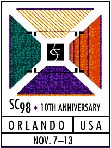Virtual Surgery
In an effort to create better trained surgeons, teaching professor Dr. Gregory Wiet and the Ohio Supercomputer Center have been working on a project known as the Validation Dissemination of Temporal Bone Dissection that looks at simulating surgery through computer visualization, applied force, and even changes in sound. Future surgeons are using this technology that allows for direct consequences to action and gives them opportunities to experience problems that may occur in a real surgery that they must react to quickly.
 The Ohio Supercomputer Center (OSC) will present Collaborations for the 21st Century -- a showcase of projects setting the tone for Ohio's future in high performance computing and communications -- at SC98: High Performance Networking and Computing, Nov. 7-13, in Orlando.
The Ohio Supercomputer Center (OSC) will present Collaborations for the 21st Century -- a showcase of projects setting the tone for Ohio's future in high performance computing and communications -- at SC98: High Performance Networking and Computing, Nov. 7-13, in Orlando.